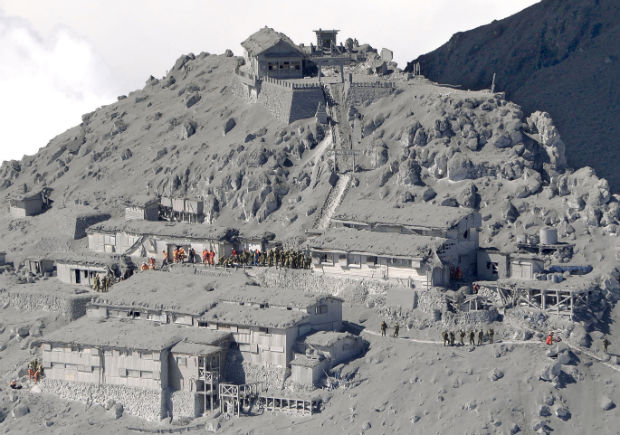Recovery of bodies underway at Japanese volcano

Firefighters and members of Japan’s Self-Defense Forces conduct a rescue operation at an ash-covered cabin, center left, near the peak of Mount Ontake in central Japan, Sunday, Sept. 28, 2014. Mount Ontake erupted shortly before noon Saturday, spewing large white plumes of gas and ash high into the sky and blanketing the surrounding area in ash. AP/Kyodo News
TOKYO – Military and other rescue workers began airlifting more than two dozen bodies from the ash-blanketed peak of a Japanese volcano on Monday morning, as family members of the missing waited at a nearby elementary school.
At least 31 people are believed to have died. Four victims were flown down Sunday, and rescuers returned to 3,067-meter (10,062-foot) Mt. Ontake on Monday morning to recover the remaining 27.
Scenes broadcast live on Japanese TV station TBS showed soldiers carrying yellow body bags one-by-one to a camouflage military helicopter that had landed in a relatively wide-open area of the now bleak landscape, its rotors still spinning.
The first bodies were flown to a nearby athletic field, its green grass and surrounding forested hills contrasting with Mt. Ontake’s ash-gray peak in the background, a reduced plume still emerging from its crater.
There, they were transferred to white police vans, while two dozen officers struggled to hold up long blue tarps under the spinning rotors, blocking the view from the media.
Article continues after this advertisementThe four brought down Sunday have been confirmed dead, said Takehiko Furukoshi, a Nagano prefecture crisis-management official.
Article continues after this advertisementThe 27 others are listed as having heart and lung failure, the customary way for Japanese authorities to describe a body until police doctors can examine it.
Saturday’s eruption was the first fatal one in modern times at Mount Ontake, a popular climbing destination 210 kilometers (130 miles) west of Tokyo on the main Japanese island of Honshu. A similar eruption occurred in 1979, but no one died.
Japanese media reported that some of the bodies were found in a lodge near the summit and that others were buried in ash up to 50 centimeters (20 inches) deep. Police said only two of the four confirmed dead had been identified. Both were men, ages 23 and 45.
Mount Ontake erupted shortly before noon at perhaps the worst possible time, with at least 250 people taking advantage of a beautiful fall Saturday to go for a hike. The blast spewed large white plumes of gas and ash high into the sky, blotted out the midday sun and blanketed the surrounding area in ash.
Hundreds were initially trapped on the slopes, though most made their way down by Saturday night.
About 40 people who were stranded overnight came down on Sunday. Many were injured, and some had to be rescued by helicopters or carried down on stretchers. By nightfall, all the injured had been brought down, officials said.
Japan’s Fire and Disaster Management Agency tallied 37 injured people and said it was trying to update the number still missing.
Furukoshi said rescuers gave priority to helping the survivors come down, leaving behind those who were obviously without hope.
Survivors told Japanese media that they were pelted by rocks. One man said he and others went into the basement of a lodge, fearing that the rocks would penetrate the roof. He covered himself with a futon, a thin Japanese mattress, for protection.
“Even small eruptions can cause major damage if people are around, as they get hit by rocks that come flying,” Nagoya University volcanologist Koshun Yamaoka said at a news conference Sunday.
Volcanoes can also kill by spewing toxic gases and lung-choking ash.
Shinichi Shimohara, who works at a shrine at the foot of the mountain, said he was on his way up Saturday morning when he heard a loud noise that sounded like strong winds followed by “thunder” as the volcano erupted.